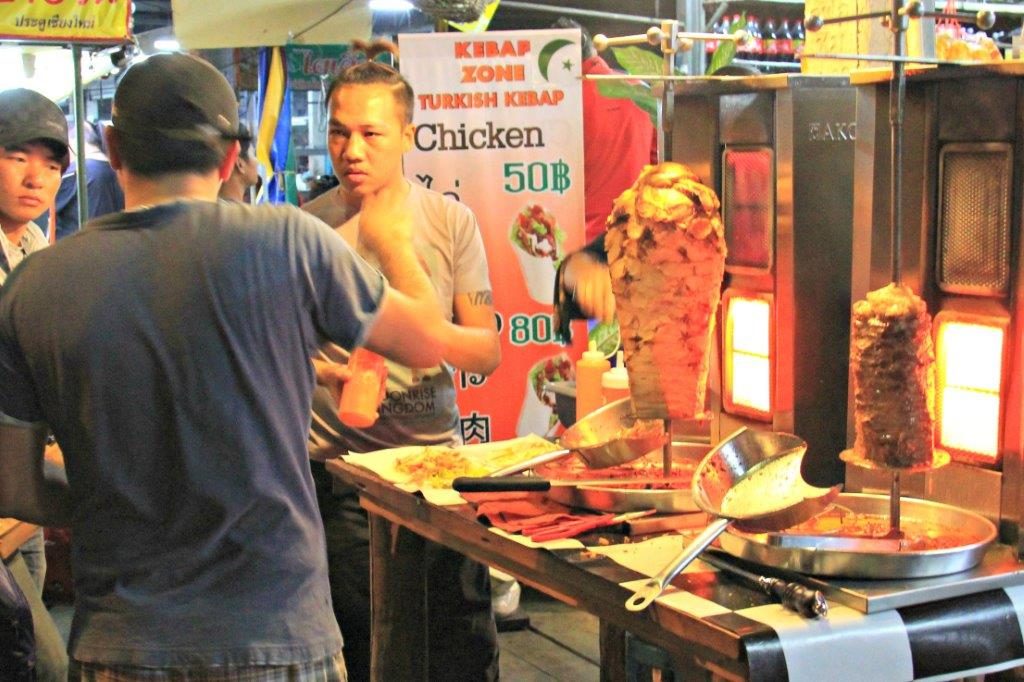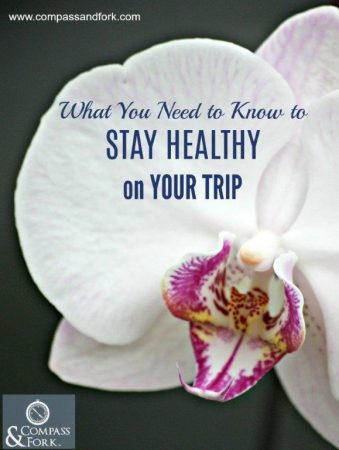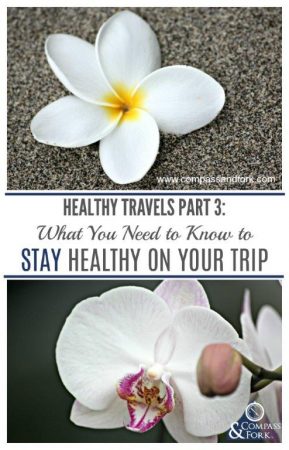 So the big day has arrived, you are finally off on your vacation you have been dreaming of for months. There are a few common sense things you can do while traveling that will reduce your chances of getting sick, which no one wants to do while on vacation. In this article we look at what you need to know to stay healthy on your trip.
So the big day has arrived, you are finally off on your vacation you have been dreaming of for months. There are a few common sense things you can do while traveling that will reduce your chances of getting sick, which no one wants to do while on vacation. In this article we look at what you need to know to stay healthy on your trip.
This is Part 3 in our Healthy Travel Series, in case you missed the first two parts, you can read Part 1: What you Need to Know About Travel Insurance: and Part 2: Healthy Travels: What You Need to Know Before You Leave Home.
Eating: How to stay Healthy on your Trip
When traveling most of us tend to eat foods we wouldn’t eat at home and also eat out more frequently. For many destinations trying the local cuisine and even eating street food is all part of the experience. So here are a few tips how to stay healthy on your trip when eating:
- Eat near markets. The local food stalls and restaurants will shop frequently at the local market, increasing the freshness and quality of the food.
- Eat at the times the locals eat. Your food will be freshly cooked and not have been sitting around for hours. (Avoid buffets, especially if you are not there at the peak time.)
- Don’t forget about ice! In places where the water is contaminated, ice usually is as well. Avoid ice in drinks, smoothes and juices.
- Drink bottled water.
Dining Out: How to Stay Healthy on your Trip
An easy tip to stay healthy on your trip is to eat in busy places when dining out. If lots of places have people in them but a few are totally empty, go to the ones with other people. Why? This is a bit of following the wisdom of the crowds, but there is also a reason some places are empty. Places with higher turnover rotate their food more often so your chance of getting fresh, healthy food is better. Food that’s been sitting around too long or been reheated multiple times often leads to food poisoning.
Ordering food from the local area is also a good idea. Products sourced locally are fresher. More popular items mean it is used quicker reducing the chance of spoilage. Food traveling long distances or sitting around for a while increases the chance of spoilage or contamination. Trying to maintain your diet from home while traveling may not be the best idea as these foods are often not fresh and have to travel long distances. In addition they can be really expensive and not the best quality. You are better off to try the local cuisine.
 Street Food: How to Stay Healthy on your Trip
Street Food: How to Stay Healthy on your Trip
If you eat from the food stalls on the street eat at the busy stands! Watch where the locals eat. An extra plus if there are local women and children in the line (their stomachs are more sensitive). Only eat cooked food. A general rule of thumb for food is “boil it, cook it, peel it, or forget it!” Washing it is often not enough. If the water is contaminated, washing it in the same water may be part of the problem.
Take a look at where they are cooking, and where the food is- does it look clean? Does the food look fresh? The problem in a restaurant is you often cannot see the kitchen so you cannot make an assessment.
Take a Probiotic
If you read Part 2:Healthy Travels: What You Need to Know Before You Leave, you know I am a fan of probiotics. I usually take a course before I go and then take some while traveling as well. Try and find a good strain that does not require refrigeration.
If you are not familiar with probiotics, this article about probiotics covers the pros and cons and answers many questions.
Eat Fermented Foods Daily
Most cultures have some sort of fermented food, with yogurt probably being the easiest to find. In the Mediterranean, parts of Eastern Europe and Turkey, kefir is also usually easy to find. Sauerkraut and kim chi are other examples of fermented foods easy to find depending on where you are traveling.
Incorporating some fermented food into your diet daily can help bolster your good bacteria and keep your stomach “happy”.
Traveling with Dietary Restrictions
 If you have dietary restrictions or allergies and are traveling to a foreign country, a little research and preparation can go a long way. As I suggested in part 2, finding some eateries, staying in accommodation where you can prepare some of your own meals and translating your dietary requirements into the local language can all assist.
If you have dietary restrictions or allergies and are traveling to a foreign country, a little research and preparation can go a long way. As I suggested in part 2, finding some eateries, staying in accommodation where you can prepare some of your own meals and translating your dietary requirements into the local language can all assist.
If you are a celiac or on a gluten free diet, Legal Nomads, a food/travel site run by Jodi Ettenberg, a celiac herself has a wealth of information, including some Gluten Free Travel Guides for various countries.
For other dietary restrictions and requirements, you might find Select Wisely or Allergy Translation helpful. You can order cards in a variety of language to help you communicate your dietary needs while traveling.
Exercise to Stay Healthy on Your Trip
It is always a good idea to maintain some type of exercise even while on vacation. Some suggestions:
- A great way to explore and stay active is to walk. This might be on your own or take a walking tour.
- If you are a runner, many hotels will have maps detailing a local running route.
- Renting a bike, swimming or other local activity.
If you are somewhere where the weather does not allow you to spend much time outdoors, choosing accommodation with access to a gym or pool can help. Use some of these suggestions in how to find the perfect accommodation for your trip.
Maintaining Your Weight While Traveling
 This is worth a mention as many of us return home heavier than when we left. We have found over many years of travel, that a great way to maintain your weight is to continue your normal exercise routine and also watch the quantity of food you eat.
This is worth a mention as many of us return home heavier than when we left. We have found over many years of travel, that a great way to maintain your weight is to continue your normal exercise routine and also watch the quantity of food you eat.
This sounds like common sense, but eating three large restaurant meals a day is often a lot more food than you would eat at home. Add to it the fact you might be eating dinner much later at night than you are used to and it is easy to see how quickly you can add a few pounds.
Some suggestions:
- Make lunch your largest meal of the day. (This can save you some money as well and can be a great way to try some iconic restaurants that are difficult to get a reservation or very expensive for dinner.) Many offer a lunch specials or a fixed price meal covering several courses.
- Some days eat only two meals, and have a healthy snack instead. This might be a large breakfast at your hotel, and then dinner.
- Find some healthy snacks and carry them with you. Fruit, nuts, or trail mix can be great snacks. If you have something small it may stop you from eating yet another large meal.
- Eat on the street, the portions are often smaller than in a restaurant.
If Something Does Go Wrong While on your Trip
 In the vast majority of cases, your holiday will be incident free. However, in the event you do have problems and you need something stronger than what is in your own first aid kit, find a doctor or a pharmacy. Pharmacy’s are usually called “chemists” outside the USA and are usually denoted by a green cross. (Like the symbol for the Red Cross, but green.) In larger cities, the pharmacist will usually speak English.
In the vast majority of cases, your holiday will be incident free. However, in the event you do have problems and you need something stronger than what is in your own first aid kit, find a doctor or a pharmacy. Pharmacy’s are usually called “chemists” outside the USA and are usually denoted by a green cross. (Like the symbol for the Red Cross, but green.) In larger cities, the pharmacist will usually speak English.
If you need a doctor, your hotel may be able to assist. Many large international hotel chains will have the contact details for an English speaking doctor that will come to the hotel. Even if you are not a guest if you are having trouble finding a doctor call and ask for contact details.
You can also head to a hospital if it is severe or you are having trouble finding an alternative. Many of the health resources listed in Part 2: Healthy Travels: What You Need to Know Before You Leave also list resources should you need assistance.
If you require medical treatment while traveling, the cost (especially if you are American) will usually be less than what you are used to at home. Depending on your destination, travel Insurance may be warranted. A good travel insurance policy will cover medical emergencies. Make sure you read the fine print and know what is covered by your policy before you need it.
If you have particular questions, or would like to share something with other travelers, please leave a comment. (You do not need a URL to leave a comment.)
Look for Part 4: of the Healthy Travels Series: What to Do When You Return Home coming in the future. Until then, we wish you safe and healthy travels.



Voyager
One of the nightmares of every traveler is that of falling sick while travelling. You have outlined some great tips to avoid. We usually try to be moderate in our eating, avoid indulging too much while travelling, that helps in keeping the necessary health balance.
Editor
Good words of advice there. Health is everything when you travel. Thanks for your comment.
Ami
Well captured. One thing that I can add here is drink plenty of water. Avoids dehydration, UTI issues and flushed out a lot of toxins. 😀 I for one, really need to remember to do that. Have a poor water intake.
Editor
Ami, you are spot on about the water. It is very easy to neglect your intake and next thing you know you have a problem. Thanks for your comment.
Corinne
These are some fantastic tips for staying healthy. I definitely only eat in places where the food turnover is high.
Editor
Yes always a bit of a clue Corinne. We also ask our accommodation hosts for recommendations too.
Erica
It’s a struggle for me to eat healthy during my travels because I make food such a priority when I indulge in a place. I try to balance it out with whatever exercise I can squeeze in especially walking and hiking.
Editor
Erica, it is always a balance isn’t it? We also like to eat the local fare and hike and walk as well. We ask at our accommodation for recommendations on eating as well. In the end though, you have to trust your own judgment. Thanks for your comment.
Rob Taylor
I promise that this isn’t just blowing smoke, but this is one of the most thoughtful travel tip articles I’ve read. As somebody with weird internal issues, some of your notes were really good reminders for me, especially as we leave on a trip tomorrow. The fermented foods tip is brilliant and truly a helpful and effective practice.
Editor
Rob thank you so much for your kind words. They are tips based on our own experiences and as you say everyone is different. We are recent converts to fermented foods, such an old skill that is still relevant today. Thanks for your comment.
Sophie
Great post. It’s always good to maintain your health while on the road especially as I myself like to try and eat a bit of everything which always turns out to be a bad idea!
Editor
Sophie. I can be a bit of a sucker for trying all the local delicacies, it is part of the trip. Thanks for your comment.
Laura @ Sometime Traveller
Great post! Getting sick definitely ruins the fun of a trip you’ve been looking forward to for so long.
Editor
Good to be prepared as you are right about being sick on a trip. It’s exactly what you don’t want. Thanks for your comment.
Milosz Zak
I think maintaining one’s weight while traveling isn’t really all that problematic. The greatest problem with travel to place in Africa, for example, is the different bacterial flora. I suggest asking for local medicines, as opposed to bringing ones from the West – they’re just too weak, and the active ingredients might not be in the right proportion to do the trick.
Editor
I’ve never had an issue bringing probiotics with me. I know what I am taking, the quality of it and I have it if I need it. In case of emergency I can try to find something locally but language can be an issue so you don’t always know what you are taking or the quality of it. I think it’s most important to pay attention to what you are eating and drink bottled water. Both go a long way toward preventing problems.
Ray Banks!
Thanks for the nice tips! It seems like I do okay with staying healthy…until I don’t. Always smart to follow this advice!
Editor
Ray, A bit of prevention can go a long way.